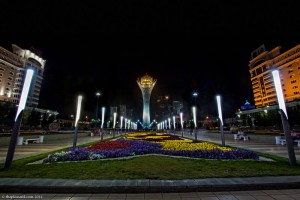Kazakhstan poised to join first-world status

Has Kazakhstan, the oil- and uranium-rich former Soviet bloc nation that borders both the Caspian and Aral Seas, emerged from the shadows of satiric infamy to become one of the great growth engines of the world? Does this ninth-largest nation on the planet have what it takes to move into first-world status and exceed the United States in terms of economic expansion?
The world is of two minds about this country that was once savaged in the film Borat as a backwards hellhole. According to a fawning National Geographic article published just this month, Kazakhstan’s new capital of Astana is “brash and grandiose—and wildly attractive to young strivers seeking success.” In other words, it's a “shining city on the hill” as envisioned by Ronald Reagan. On the other hand, the current issue of The Economist sees trouble in paradise, with oil worker strikes and unexplained riots pockmarking the country.
Astana is truly a site to behold, with modern architecture and a cosmopolitan lifestyle that is attracting upwardly mobile and well-educated young people. Its creation was the driving obsession of the nation’s 71-year-old President and virtual dictator Nursultan Nazarbayev. For all of his benign leadership, he remains a strongman with a vision for his nation. And that vision does not include democratic reforms.
There can be little doubt about Kazakhstan’s potential. In addition to its rich oil and uranium resources, it has abundant farmland and direct access to major seaports. According to The Economist:
“Growth has averaged 8% a year for the past decade, a far better performance than any of the other ex-Soviet Central Asian economies. Average income per person is now over $11,000 a year, twice as much as Turkmenistan and six times more than Uzbekistan, which, with 28m people, is the region’s most populous country. It puts Kazakhstan nicely among the ranks of middle-income nations.”
The new capital city has an Oz-like aura, with futuristic buildings and vast, attractive plazas. There is a sense of optimism among its residence that has tamped down skepticism about the city’s remote location.
“Never mind that the previous capital, Almaty, is a temperate, pleasant city that few save the president wanted to leave,” National Geographic wrote in its special issue on Kazakhstan. “In late 1997 the government officially relocated to frigid, windswept Aqmola, 600 miles to the north, on the treeless steppe of Central Asia. The town was subsequently rechristened Astana—the Kazakh word for ‘capital’—a change that is commemorated every July 6 on Astana Day, which coincides with Nazarbayev's birthday.”
But that self-same visionary also has a reputation for corruption and human rights violations. Despite his apparent popularity as a leader, elections appear to be rigged, and the president has placed family members in key governmental positions. Ironically, reports The Economist:
“election-rigging Kazakhstan’s triumph last year was to chair the Organisation for Security and Economic Co-operation, which is dedicated to free votes and democracy….”
And because much of Kazakhstan’s success is through the will of its charismatic president, there is grave concern about succession – a subject that The Economist notes, “may not be raised in public.” There are rumors that Nazarbayev is ill and being treated for prostate cancer in Germany. That makes the upcoming Parliamentary elections an urgent matter, and possibly the cause for recent unrest, as members of the opposition believe the outcome is a foregone conclusion.
Meanwhile, the educated young people of Astana are filling high-level government positions and enjoying their lattes at the new capital’s cafes. It's almost as if there are two (or more) Kazakhstans. Which will emerge over the long haul, and whether new leadership can sustain the arc of growth currently washing over the nation, remain to be seen.




